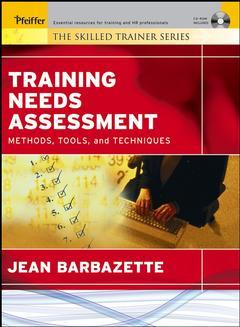Training needs assessment : methods, tools, and techniques w/cd Methods, Tools, and Techniques
Langue : Anglais
Auteur : Barbazette Jean

This book covers the essentials of needs analysis from the emerging trainer's perspective by providing just the right amount of support and knowledge without going too deep into the subject. The topics covered include when and how to do a training needs analysis, using informal and formal analysis techniques, goal, task and population analysis, and how to develop and present a training plan for management approval. Each chapter includes appropriate data gathering tools. The Skilled Trainer series provides practical guidance for those who've had some exposure to training and would like to take their career to the next level.
Contents of the CD-ROM. Acknowledgments. Introduction. Chapter 1: What Is Needs Assessment? What Is Needs Assessment? Why Conduct a Needs Assessment? Why Are Needs Assessments Valuable to an Organization? How Are Training Needs Assessments Done? What Is Involved in the Process of Conducting a Needs Assessment? How Can You Convince Your Client to Invest in a Needs Assessment Effort? How Can the Trainer Set Expectations and Gain Participation When Conducting a Needs Assessment? Who Decides Which People Are Involved and What Measures Are Assessed? How Are Problems and Barriers Overcome When Conducting a Needs Assessment? Chapter 2: Is It a Training Need? How to Conduct a Performance Analysis. What Is Performance Analysis? What Is the Purpose of Performance Analysis? How Is Performance Analysis Conducted? What Is Post-Training Performance Analysis? What Are the Problems and Cautions When Conducting Performance Analysis? What Needs to Be Done with the Information Collected? Chapter 3: How to Gather Information. What Is the Purpose or Objective of Collecting the Information? Where Can You Find Existing Information, or Does New Information Have to Be Gathered? What Is the Difference Between Informal and Formal Information Collection? What Are the Key Elements in Constructing Written Surveys? What Are Different Forms for Survey Questions? What Are Guidelines to Collect Statistically Significant Information? When and Why Are Interviews Appropriate to Gather Information? Chapter 4: Feasibility Analysis. What Is the Purpose of a Feasibility Analysis? How Is a Feasibility Analysis Conducted? Chapter 5: Needs Versus Wants Surveys. What Is a Needs Versus Wants Survey? How Is It Conducted? Who Should Do It and How to Interpret Results? Chapter 6: Goal Analysis. What Is the Purpose of Goal Analysis? How Is It Conducted? Chapter 7: Task Analysis. What Is the Purpose of Task Analysis? What Is the Difference Between Job Analysis and Task Analysis? How Is It Conducted? What Makes Conducting a Task Analysis Difficult? What Is Done with the Results of a Task Analysis? Chapter 8: Target Population Analysis. What Is the Purpose of Target Population Analysis?. How Is Target Population Analysis Conducted?. What Types of Decisions Are Made from the Results of a Target Population Analysis? Chapter 9: Contextual Analysis. What Is Contextual Analysis? How Will the Training Be Delivered? When Will the Training Be Presented? What Are the Other Requirements to Deliver the Training? Chapter 10: Develop and Present a Training Plan to Management. What Is in a Ten-Part Training Plan? How Is a Plan Presented to Management to Gain Approval? Needs Assessment Competencies. Training Planner Competencies. Glossary. Bibliography. Index. About the Author. How to Use the CD-ROM. Pfeiffer Publications Guide.
Date de parution : 02-2006
Ouvrage de 192 p.
19.3x23.2 cm
Thème de Training needs assessment : methods, tools, and... :
© 2024 LAVOISIER S.A.S.



